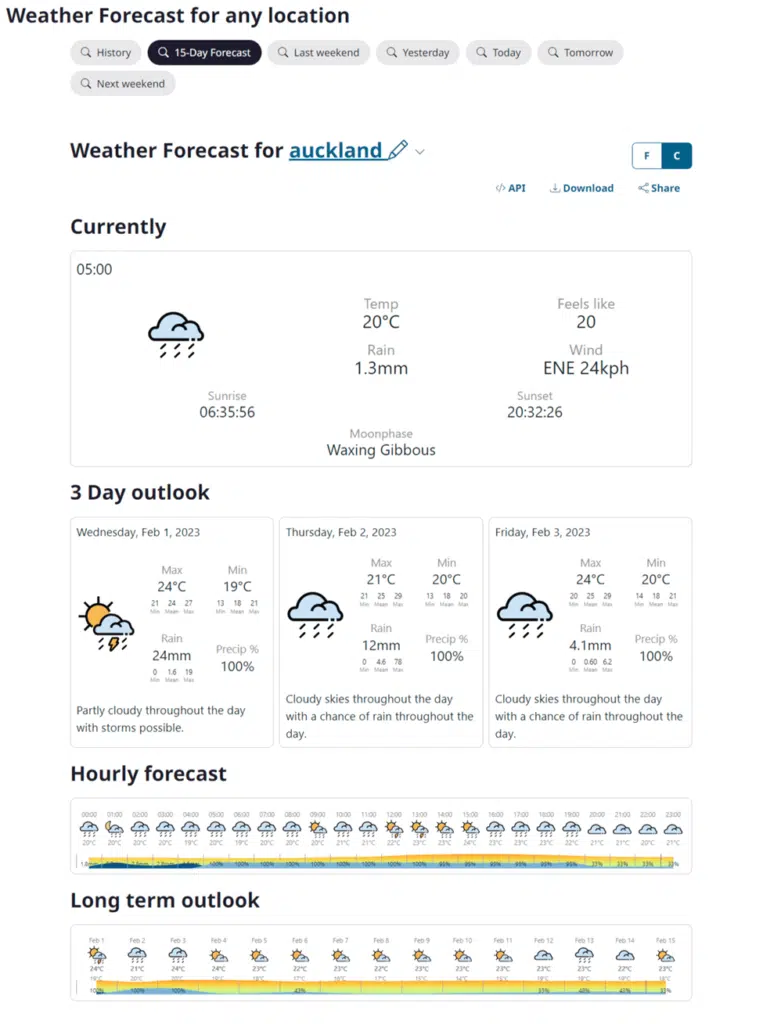Auckland is the largest city in New Zealand and is located in a region prone to heavy rainfall and flash flooding.
On Tuesday, authorities in New Zealand advised residents to prepare for the possibility of additional rainfall and to take necessary precautions to protect themselves and their property. Over the weekend, cleanup efforts began after heavy rain caused flooding and landslides in the country’s largest city.

New Zealand’s North experienced its heaviest rainfall from January 27 to January 29. During this time, Auckland quickly received a large amount of rainfall, with 79% of its typical summer rainfall falling in just 15 hours on Friday. The heavy rain caused flash floods and landslides in the area, resulting in the deaths of four people. An emergency has been declared in Auckland and Northland, the country’s northernmost regions. Further complicating the situation, more rain is forecast in the coming days, which could lead to further flooding and worsening existing damage.
Over the past four days, Auckland has received a high amount of rainfall, and further rain could lead to increased flooding and landslides. Due to contaminated water, beaches near the city are closed. Schools in Auckland will be closed until February 7 as many main roads are blocked. Auckland Airport has reopened after being shut down temporarily due to flooding damage. Evacuation centers have been set up throughout the City.
Another severe rain event is expected in the North of New Zealand for 12 to 24 hours starting Tuesday afternoon, with up to 120mm of rainfall possible in some areas of Auckland. Prime Minister Chris Hipkins has announced that his government will accept the offer of support from Australia in response to the floods. He acknowledged that there has been substantial damage in Auckland and the North Island and that some have criticized the limited communication about the flood situation.
The Prime Minister confirmed the death of three people and sent his sympathies to the families. The Prime Minister has stated that his priority is to provide support and resources to help residents of Auckland recover from the flood and return to normal safely.
On Sunday, police reported assisting with managing traffic and closing roads due to landslides, flooding, and damage caused by the heavy rainfall.
Authorities reported widespread flooding and a landslide in the Bay of Plenty that damaged homes and put nearby buildings at risk. Thousands of homes are without clean water and electricity.
On Monday, the city’s mayor shared his view on Twitter. He warned Auckland, saying that even normal levels of rainfall in the upcoming days could result in more flooding and damage due to a large amount of precipitation the city has received.
Emergency services received 30 overnight calls on Monday, including responding to a landslide where a carport slid down a hill. The council has deemed 69 houses as the uninhabitable and restricted entry. Access to 300 additional properties was limited due to potential risk.
The National Institute of Water and Atmospheric Research reported that several places in Auckland saw their wettest day on Friday.
The recent floods in Auckland have caused significant damage, including structural damage to homes and businesses and disruption to transportation and infrastructure. The exact cost of the damage is still being calculated, but it is expected to be substantial. Economists predict the rebuilding efforts post-flooding could drive up inflation in New Zealand, as there will be a need for new vehicles and household items, as well as a rise in construction for repair or reconstruction of houses and infrastructure.
In addition to the immediate damage, the floods have also significantly impacted the local economy, with businesses and tourism being affected. The authorities are working to assess the damage and provide support to those affected. You can visit our Weather Forecast Dashboard to get the complete weather forecast.

While the floods in Auckland have been devastating, the people of New Zealand are resilient and have come together to support each other during this challenging time. The authorities are working closely with local communities and businesses to help them recover from the floods and get back on their feet as soon as possible.

